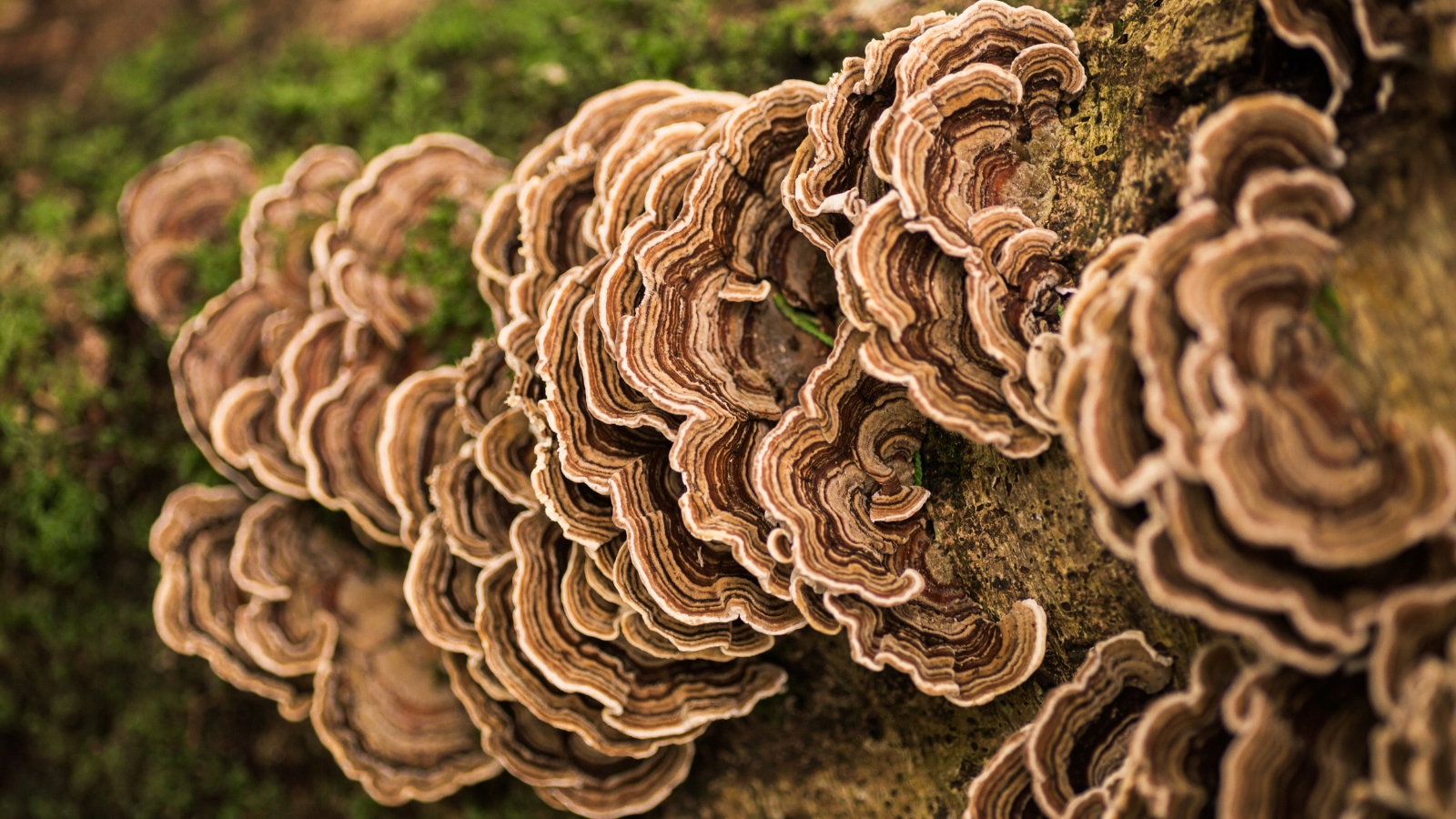The turkey tail mushroom, scientifically known as Trametes versicolor, occupies a distinguished place among medicinal mushrooms. With its vivid, concentric circles of color resembling a turkey’s tail, this fungus has captivated the eye and piqued the interest of traditional medicine practitioners and modern scientists alike. Esteemed for its immune-boosting properties, turkey tail stands out among over a hundred species of medicinal mushrooms for its potential to support health and combat illness.
The intersection of ancient wisdom and contemporary research has propelled turkey tail into the spotlight, especially in the fight against cancer. Its rich composition of antioxidants, including phenols and flavonoids, alongside unique polysaccharopeptides like PSP and PSK, underscores its significance. These compounds have been the focus of extensive studies, highlighting turkey tail’s role in reducing inflammation, supporting the immune system, and offering adjunctive benefits in cancer treatment.
This guide examines the fascinating journey of turkey tail mushrooms from forested logs to the forefront of health innovation, uncovering the science, applications, and therapeutic potential of this extraordinary fungus.

What Is the Turkey Tail Mushroom?
The turkey tail mushroom is a distinctive polypore fungus ubiquitous across forested regions of the world. It is easily recognized by its striking, multi-colored concentric circles, which vividly mimic the appearance of a turkey’s tail. Found primarily on dead wood, this resilient mushroom plays a crucial ecological role in decomposing organic matter and contributing to the nutrient cycle in its habitat.
At the heart of Trametes versicolor’s acclaim in the medicinal mushroom community are its bioactive constituents, notably polysaccharopeptides PSK and PSP. These compounds have garnered scientific interest for their potential in immune modulation and as complementary agents in cancer therapy. The turkey tail mushroom’s repertoire also includes an impressive array of antioxidants, such as phenols and flavonoids, which are essential for mitigating oxidative stress and inflammation.
Renowned in traditional medicine for its health-enhancing benefits, turkey tail has been a subject of modern research aimed at understanding its therapeutic potential. This convergence of historical use and contemporary scientific exploration underscores the mushroom’s significance in natural health discussions and its promising future in integrative medicine.

Health Benefits of Turkey Tail Mushroom
The turkey tail mushroom is a powerhouse of medicinal properties. Its health benefits are grounded in science and tradition, making it a focal point for researchers and health enthusiasts alike. Here are the key health benefits attributed to turkey tail mushrooms.
Immune System Enhancement
Turkey tail is renowned for its capacity to boost the immune system. The polysaccharopeptides, PSK and PSP, are at the forefront of its immune-enhancing properties. These substances stimulate the immune system by activating immune cells such as natural killer cells and dendritic cells, which are vital for maintaining the body’s defense against pathogens and cancer cells. This immunomodulatory effect makes turkey tail a valuable adjunct in cancer treatment and prevention strategies.
Cancer Support and Recovery
Among the most compelling aspects of turkey tail’s health benefits is its potential in cancer therapy. Studies have highlighted the mushroom’s ability to inhibit tumor growth and enhance the efficacy of chemotherapy. PSK, in particular, has been approved in Japan as a cancer treatment supplement, demonstrating improved survival rates in patients with certain types of cancer when used alongside conventional treatments.
Support for Chemotherapy Patients
The adverse effects of chemotherapy, such as weakened immune function and increased oxidative stress, can be mitigated by the supportive properties of turkey tail mushrooms. Its immune-boosting and antioxidant capabilities help strengthen patients undergoing chemotherapy, potentially reducing side effects and enhancing recovery.
Antioxidant Properties
The rich content of antioxidants in turkey tail, including phenols and flavonoids, plays a critical role in protecting the body against oxidative stress and inflammation. These antioxidants neutralize harmful free radicals, potentially reducing the risk of chronic diseases and supporting overall health and longevity.
Gut Health and Microbiome Support
Turkey tail contains prebiotics, which nourish beneficial gut bacteria and contribute to a healthy microbiome. A balanced gut microbiota is essential for digestive health, immune function, and mental well-being. By promoting the growth of friendly bacteria and suppressing harmful ones, turkey tail can help maintain gut balance and prevent gastrointestinal disorders.

Usage and Dosage of Turkey Tail Mushroom
The turkey tail mushroom’s versatility in form and function allows it to be incorporated into daily wellness routines or utilized in more targeted therapeutic regimens. Understanding the various methods of consumption and recommended dosages is essential for harnessing its full potential. Here’s a guide to the usage and dosage of turkey tail mushrooms.
Forms of Consumption
- Capsules and Tablets: For convenience and precision in dosage, turkey tail mushroom is often taken in capsule or tablet form. This method ensures a consistent dose of the mushroom’s active compounds, making it a popular choice for both daily supplementation and therapeutic use.
- Powders: Turkey tail powder can be mixed into smoothies, juices, or even food, offering a flexible way to integrate this mushroom into your diet. Powdered forms retain most of the mushroom’s nutritional and medicinal properties, providing a comprehensive health boost.
- Mushroom Coffees and Teas: Infusing turkey tail extract into coffees and teas has become a trendy way to enjoy its benefits. These beverages offer a palatable and comforting method of consumption, ideal for those looking to incorporate medicinal mushrooms into their daily rituals.
- Edibles: Some health food and supplement companies have started offering turkey tail mushrooms in edible form, such as in bars or gummies. This innovative approach caters to those seeking both convenience and the health benefits of turkey tail in a tasty format.
Recommended Dosages
- For Daily Wellness: Incorporating turkey tail mushrooms into your daily health regimen focuses on the prevention and maintenance of general well-being. A typical daily dose ranges from 500 to 1,000 mg of turkey tail mushroom extract. This dosage supports immune function, provides antioxidants, and promotes gut health without overwhelming the system.
- For Targeting Specific Illnesses: When used for more targeted therapeutic purposes, such as adjunctive cancer therapy or boosting immune function during chemotherapy, the dosage of turkey tail mushroom can be significantly higher. Clinical studies have utilized dosages ranging from 3,000 to 9,000 mg of PSK (polysaccharide Krestin) per day for cancer patients. However, these dosages should be approached with guidance from a healthcare professional to ensure safety and efficacy.
It’s important to note that while turkey tail mushroom offers promising health benefits, optimal dosages can vary based on individual health conditions, age, and overall health status. Consulting with a healthcare provider before beginning any new supplement regimen is always recommended, particularly for those with existing health conditions or those taking prescription medications.

Safety, Precautions, and Side Effects of Turkey Tail Mushroom
Turkey tail mushroom is widely regarded for its health-promoting benefits, but like any supplement, it comes with considerations for safety and potential side effects. Understanding these aspects is crucial for the responsible and beneficial use of turkey tail mushrooms.
Safety and Precautions
Turkey tail mushroom is generally considered safe for most people when consumed in amounts typically found in foods and supplements. However, due diligence is necessary, especially for those with pre-existing health conditions or those taking medications. Key precautions include:
- Consultation with Healthcare Providers: Before integrating turkey tail or any new supplement into your regimen, especially for therapeutic purposes, consulting with a healthcare professional is paramount. This ensures that the supplement does not interfere with existing treatments or conditions.
- Allergies and Sensitivities: Individuals with mushroom allergies and sensitivities should approach turkey tail cautiously. While rare, allergic reactions are possible and can range from mild to severe.
- Pregnancy and Breastfeeding: There is limited research on the effects of turkey tail mushrooms during pregnancy or breastfeeding. As a precaution, it is advised to avoid use during these periods unless otherwise recommended by a healthcare provider.
Side Effects
Turkey tail mushroom is well-tolerated by most individuals, with side effects being rare and generally mild when they do occur. Possible side effects might include:
- Digestive Discomfort: Some individuals may experience digestive issues such as gas, bloating, or changes in bowel movements due to the mushroom’s fiber content or immune-modulating effects.
- Immune System Overactivity: Given its immune-boosting properties, there’s a theoretical risk that turkey tail could overstimulate the immune system in some individuals, particularly those with autoimmune diseases. Monitoring and moderation are advised.
Turkey tail mushroom offers a wealth of health benefits with minimal risk of side effects for the majority of users. As with all substances, start small and observe its effects before you increase the dosage.

Harnessing the Power of Turkey Tail Mushroom
The journey into the scientific and therapeutic exploration of the turkey tail mushroom has highlighted its remarkable potential for enhancing health and supporting disease treatment. This mushroom, deeply rooted in traditional medicine and now embraced by modern science, demonstrates significant benefits from immune system support to playing a role in cancer therapy.
Turkey tail mushroom’s story is one of natural resilience and healing, offering a glimpse into the future of integrative health approaches. As we continue to uncover the depths of its benefits, turkey tail mushroom is set to play a crucial role in enriching our pursuit of wellness and natural health solutions.














